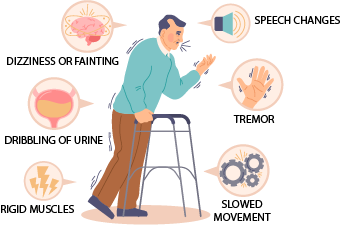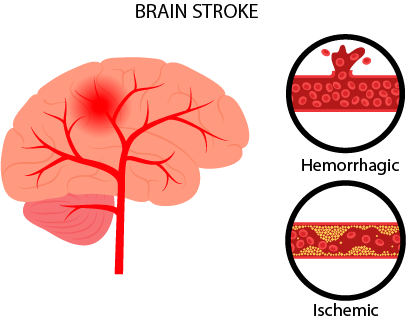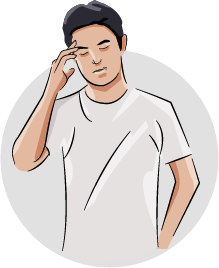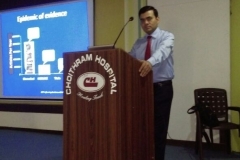

MBBS, MD (Medicine), DM (NEUROLOGY)
Dedicated to providing High-Quality Neurological Support
MBBS, MD (Medicine), DM (NEUROLOGY)


Best Neurologist Services in Indore
Emergency Services
24*7 Emergency Neurology Services & Care in Indore for the Most Demanding Cases with Round-the-Clock Availability of Neurologists...
Stroke Care
The most common neurological emergency is acute stroke. Acute ischaemic stroke can be treated with special clot lysis therapy known as thrombolysis...
Botox and Movement
Complex movement disorders like blepharospasm, hemifascial spasm, oromandibular dystonia, cervical dystonia, writers cramp are efficiently being...
Epilepsy Clinic
We have extensive experience in diagnosing and treating complicated epilepsy with great success.
Electrophysiology Lab
Neurology Department at Choithram Hospital, Indore was first in MP to start a full fledged Neurophysiology unit.
Diseases Treated by the Top Neuro in Indore
At our clinic, led by the best neurologist in Indore, we specialize in diagnosing and treating a wide range of neurological conditions. Whether you’re dealing with migraines, epilepsy, stroke, Parkinson’s disease, multiple sclerosis, or other nervous system disorders, our expert team is committed to providing personalized care. With advanced diagnostic tools and treatment options, we ensure each patient receives the highest quality care to improve their well-being and quality of life. Trust us to help you manage your neurological health with compassion and expertise.

Sciatica
Sciatica is a term used to describe pain that originates in the lower back and radiates through the buttocks, legs and feet. It can also cause other symptoms...

Multiple Sclerosis
Multiple sclerosis (MS) is a inflammatory demyelinating disorder of central nervous system that affects the brain, optic nerve and spinal cord. Clinical cour...

Parkinsons Disease
Parkinson's disease is a progressive degenerative disorder of brain due to loss of dopamine-producing cells in basal ganglion region of brain. The four prima...

Stroke
STROKE is sudden vascular damage to brain either due to blockage of a blood supply of brain (ischemic), or leakage of blood in brain (hemorrhagic). Sudden nu...

Epilepsy
Epilepsy is a common neurological disorder characterised by recurrent epileptic seizures (mostly sudden jerking, tingling or loss of consciousness) caused

Vertigo
Vertigo is an illusion of motion or spinning sensation. But sometimes also refer to chronic or intermittent sensation of loss of balance. Vertigo is caused...
Reviews for Indore's Leading Neurologist
Media & Events: Top Neurologist in Indore
Showcases the latest news, achievements, and community involvement of the best neurologist in Indore. Stay updated on expert medical insights, upcoming health seminars, and special events where you can learn more about advanced neurology care.
















Frequently Asked Questions
What is Epilepsy?
Epilepsy is a common neurological disorder characterised by recurrent epileptic seizures (mostly sudden jerking, tingling, or loss of consciousness) caused by abnormal or excessive electrical discharges from brain cells. Read More
What is Parkinson’s Disease?
Parkinson’s disease is a progressive degenerative disorder of brain due to loss of dopamine-producing cells in basal ganglion region of brain. The four primary symptoms of Parkinson’s are tremor or trembling in hands, arms, legs, jaw, and face; rigidity Read More
What is Migraine?
Migraine is one of most common type of headache disorders, characterised by constant throbbing pain at the temples and forehead, one or both sides of the head. The pain is usually accompanied by a combination of nausea, vomiting, and sensitivity to light and noise. Some people (about 15% of migraine sufferers) experience an aura (visual disturbances) before an attack. Read More
What is Multiple Sclerosis?
Multiple sclerosis (MS) is a central nervous system disorder that affects the brain ,optic nerve and spinal cord. MS is an inflammatory demyelinating disorder because the myelin sheath that protects nerves is stripped off during inflammation. When this happens, the nerves cannot conduct electricity as well as they should, causing various symptoms. Read More
What exactly is Vertigo?
The precise definition of vertigo is an illusion of motion. But it also refers not just to illusions of motions, but chronic or intermittent sensation of loss of balance. Read More
What is Sciatica?
Sciatica is a term used to describe a group of symptoms that can result from compression of the sciatic nerve. The largest and longest nerve in the body, the sciatic nerve, spans from the base of the spine. Read More
What is a Stroke?
STROKE is sudden vascular damage to brain either due to blockage of a blood supply of brain (ischemic), or leakage of blood in brain(hemorrhagic). In an ischemic stroke, a blood clot blocks or plugs a blood vessel or artery in the brain. About 80 percent of all strokes are ischemic. In a hemorrhagic stroke, a blood vessel in the brain breaks and bleeds into the brain. Read More
What is Sleep Disorder?
Insomnia is usually a symptom, typically secondary to something else. It is best characterized as the inability to fall asleep, stay asleep, or waking too early in the morning. These types of sleep disruptions are often indicators of other medical or psychological problems, such as sleep disorders or depression and anxiety. Read More

